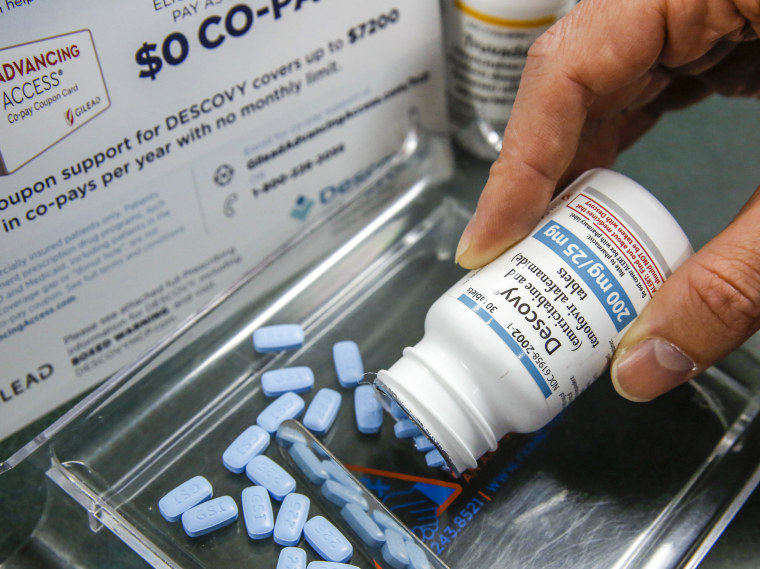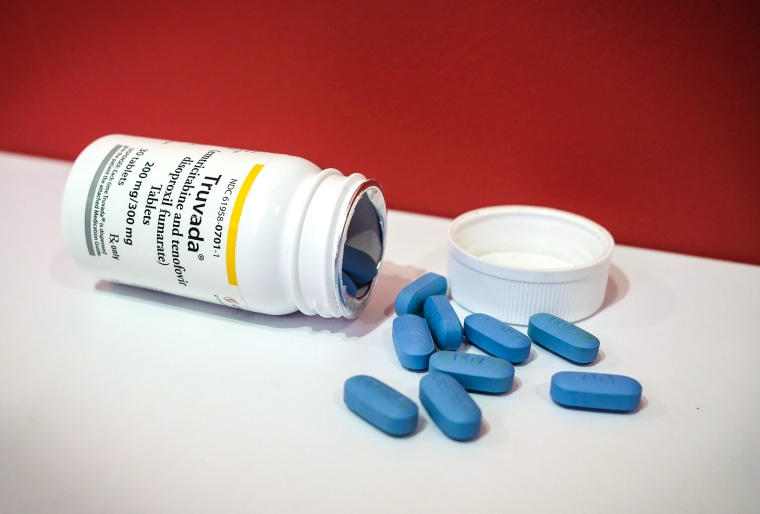A national health task force’s sterling new endorsement of a long-acting injectable medication for use as HIV prevention will require health insurers to begin covering the pricey drug by 2025. Such expanded access to the preventive therapy could lend a much-needed boost to the country’s relatively anemic efforts to thwart the HIV epidemic.
However, the hotly anticipated development in the four-decade fight against HIV is on a legal collision course. A conservative lawsuit advancing through the courts could void the requirement that insurers cover the HIV-prevention drug, along with dozens of other coverage mandates stemming from the task force’s recommendations. That could have a sweeping impact on people’s ability to afford preventive interventions and screenings for a host of health conditions.
The U.S. Preventive Services Task Force, which is an independent, volunteer assembly of medical experts, issued a new recommendation Tuesday for using antiretroviral medications to prevent HIV, a protocol known as pre-exposure prophylaxis, or PrEP. After it commissioned a systematic review of the relevant scientific literature, the task force published the findings in JAMA. The paper states “with high certainty” that all three currently approved forms of PrEP provide a “substantial net benefit” to adults and adolescents at elevated risk of HIV.

The endorsement concerns two daily oral medications, Gilead Sciences’ Truvada and Descovy, and ViiV Healthcare’s long-acting injectable medication, Apretude. Research has shown that Apretude, which is provided every eight weeks by a health care worker, is superior to Truvada at preventing HIV across a population of at-risk people. But nearly two years after Apretude hit the market, its potential to combat HIV in the U.S. remains woefully unrealized; because of its high cost, insurers rarely cover it.
Dr. Kenneth Mayer, the medical research director at the Fenway Institute, an LGBTQ-focused clinic in Boston, characterized the task force’s Apretude recommendation as “gratifying.” However, he expressed frustration over the roadblocks prescribers such as him have faced when they seek to put patients on Apretude.
“Insurance hassles have definitely been part of the problem, including high copays and requirements that providers demonstrate that patients failed oral regimens,” said Mayer, who was the lead author of a 2020 paper that found Descovy was just as effective as Truvada at preventing HIV.
The task force granted Truvada, Descovy and Apretude “A” ratings for their use as HIV PrEP, as it previously had for Truvada alone in 2019. Under a provision of the Affordable Care Act, A or B ratings prompt a legal mandate that the vast majority of insurers, including state Medicaid programs expanded under the ACA, cover the preventive intervention in question and at no out-of-pocket cost to patients. Medicare administrators are considering new coverage rules about PrEP under which the public insurance plan would fall in lockstep with the policies about HIV prevention medication.
Dr. Jonathan Mermin, director of the Centers for Disease Control and Prevention’s National Center for HIV, Viral Hepatitis, STD and TB Prevention, said the task force’s Apretude recommendation represented “a major step” toward expanding PrEP access.
“More ways to take PrEP means more people can benefit,” he said.
A legal showdown
By law, insurers now have until January 2025 to begin widely covering Apretude. But the requirement could be nullified by a lawsuit pending in the 5th U.S. Circuit Court of Appeals.
The suit is being waged by a group in Texas, many members of which are self-described Christian business owners, who oppose covering PrEP on religious grounds. In September, a U.S. district judge in Texas agreed that the plaintiffs’ religious freedom had been violated and ruled that the health task force had no constitutional authority to dictate insurance policy, because its members were not appointed by the president or confirmed by the Senate. The ruling has been stayed pending appeal.
Elizabeth Kaplan, an expert in health care law at Harvard Law School, said she “can’t venture a guess as to how the 5th Circuit will rule in this case,” but she noted that it “is one of the most conservative federal appellate courts in the country.” Ultimately, she said, she expects the case to land on the Supreme Court’s docket.
The case’s impact could stretch well beyond the HIV battleground. Ultimate victory for the plaintiffs could vacate the federal government’s authority to follow the task force’s recommendations and mandate free access to, for example, screening for colorectal and lung cancer, statin treatment and smoking cessation therapy.
The PrEP landscape
In July 2021, federal health authorities announced that insurers could not charge patients for Truvada as PrEP or for the quarterly clinic visits and lab tests required to maintain prescriptions. Should the task force lose its authority, insurers could return to imposing such fees. Truvada’s use as HIV prevention was, however, already widely covered by insurance before the task force ever weighed in. And Gilead has long covered up to $7,200 in annual out-of-pocket expenses for PrEP.
The PrEP landscape has evolved dramatically since the task force first lent its vote of confidence to Truvada four years ago. The Food and Drug Administration approved Descovy for use as PrEP in October 2019, followed by Apretude in December 2021. Truvada became available as a cheap generic in the spring of 2021 and is often available for as little as $30 per month. Consequently, insurers have largely refused to cover Apretude, which has a list price of $1,900 per month. Medicaid is already required to cover the injectable drug, although physicians may have to submit prior authorization requests to some state programs.

Descovy is considered gentler on the kidneys than Truvada. But many experts believe it offers no clinically significant benefit to most PrEP users. And so, given Descovy’s $2,160 monthly list price, insurers began restricting coverage for its use for HIV prevention after inexpensive generic Truvada came online. Kaplan said it remains unclear whether the health task force’s inclusion of Descovy in its new recommendation might compel insurers to cover it more liberally.
Jeremiah Johnson, the executive director of the public health advocacy nonprofit group PrEP4all, said the impact of the task force’s support for Apretude “will depend largely on how seriously the federal government takes enforcement of coverage with insurers.”
“And, of course,” Johnson added, “this will mean nothing” for the uninsured.
A nation in need of a game changer
Compared with other wealthy nations, many of which have experienced plummeting HIV transmission rates in recent years, the U.S. is a notable laggard. International health authorities estimate that from 2015 to 2021, the annual new infection rate dropped by more than 70% in the Netherlands and 44% in Australia, whereas the CDC estimates that the U.S. rate declined by only 12% from 2017 to 2021, from 36,500 to 32,100 cases.
The CDC points to insufficient PrEP use among those most at risk of HIV as a major drag on the nation’s efforts to combat the virus.The agency estimates that gay and bisexual men account for 71% of new cases of the virus and that about 814,000 members of the demographic are good PrEP candidates. A recent CDC study found that only about 190,000 people — a group that other research suggests is overwhelmingly made up of gay and bisexual men — were taking PrEP last September. And crucially, PrEP has never become sufficiently popular among Black and Latino men who have sex with men, who contract HIV at much higher rates than their white counterparts.
If the results of a major clinical trial are any guide, Apretude could pack a substantial public health punch. In a double-blind, placebo-controlled study of gay and bisexual men and transgender women, published in 2021, the participants randomized to receive the injectable drug contracted HIV at a rate two-thirds lower than those who got Truvada as PrEP.
When they are taken as prescribed, Truvada and Descovy lower HIV risk by at least 99%. But many people do not take the pills daily, leaving them vulnerable to the virus. Apretude apparently bridged that gap in the clinical trial.
Dr. Hyman Scott, an HIV prevention expert at the San Francisco Department of Public Health, characterized the need to take a daily pill as the “Achilles’ heel of oral PrEP.” He expressed hope that widely accessible Apretude could mitigate the stark racial disparities in HIV transmissions.
However, Scott noted, “users will still need to adhere to the clinic visits.” That raises the question of whether the imperative that Apretude recipients attend medical appointments every two months, rather than every three months for Truvada or Descovy, will substantially alienate at-risk people.
There are, meanwhile, longer-acting forms of PrEP in the research pipeline, including implants and Gilead’s lenacapavir, which requires injecting only every six months. But even if the health task force keeps its authority in the wake of the legal challenge, insurers would most likely not wind up having to begin covering lenacapavir until 2030.






